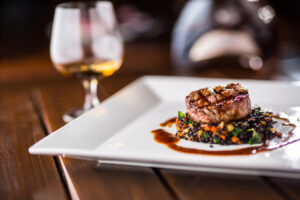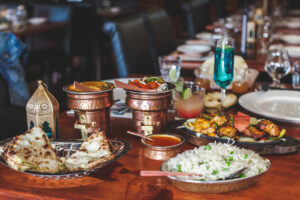Culinary Tourism & Hotels
Culinary Tourism – a Tasty Temptation

Interest in experience travel continues to grow, and culinary tourism is at the top, tempting travelers with the immersive experiences they seek.
The growing appetite for unique gastronomic adventure factors highly in travel planning. It also offers many opportunities for the hospitality industry.
Hotels can partner with local chefs and cooking schools, create special menus showcasing the flavors of your region, host culinary events and cooking classes, and offer tailored packages for the culinary curious.
Texas offers a big spread of gastro adventure, from world-famous TexMex and Barbeque, the seafood bounty of the Gulf Coast, the southern hospitality and soul food of the South, the exotic melting pots of our big cities to surprising new fusions that mix it all up.
Hotels can leverage their unique regional cuisines to appeal to the growing market of foodie travelers.

Here are Some Strategies to Consider:

Take stock of your opportunities to partner with notable chefs, restaurants and cooking schools to create unique experiences. Consider these:
- Culinary Partnerships and Collaborations:
- Partner with chefs, restaurants, or local cooking schools to create unique dining experiences that showcase the authentic flavors of the region.
- Collaborate with local food and wine festivals and culinary events to offer exclusive experiences to guests.
- Culinary Events and Festivals:
- Host or participate in culinary events and festivals celebrating your region’s cuisine.
- Create special or seasonal menus, and host cooking demonstrations during these events to attract both local and international visitors.
- Culinary Tourism Packages:
- Offer tailored packages that include guided food garden or farm tours, cooking classes, and exclusive dining experiences.
- Collaborate with local businesses to provide a more immersive culinary journey for guests.
- Embrace Local Ingredients and Techniques:
- Use locally sourced ingredients and traditional cooking techniques to enhance the authenticity of the dining experience. Know their story
- Support local farmers and producers by incorporating their products into the hotel’s menu.
- Culinary-Themed Amenities:
- Offer amenities such as in-room cooking classes, show off your rooftop gardens, or herb gardens that allow guests to engage with the region’s culinary culture.
- Provide cooking kits or recipe books that feature local recipes for guests to recreate at home.
- Curate Your Table
- Pay attention to detail with your glasses and linens, table spices, and condiments for the full immersive experience
- Don’t forget the drinks
- A beautiful well-crafted cocktail in beautiful or interesting glassware is a literal thirst trap for trigger-happy Instagramers.
- Ambient Music
- This is also a pairing that enhances the experience. People probably don’t want to mix heavy metal with their Tex-Mex (unless that’s your angle). Set the mood, perhaps some Texas Swing with your stockyard sirloin, Reggae goes well with the pecan-crusted redfish, Jazz with the crawfish, spicy Raga with Tikki Masala, you get the idea.
- Get creative
- Fusions are fun. Tikka con Queso pairs well with a Mango Margarita
- Train your Culinary Concierges
- Educate your staff on the story behind the cuisine. Everyone says ‘farm to table,’ but educate them about your farm and your table.
- Social Media and Food Influencers:
Yes, Instagram pic takers can be annoying sometimes, but social media platforms like Instagram and YouTube have made it easier for food lovers to share their culinary adventures with the world and promote your establishment. Food influencers and bloggers play a vital role in popularizing culinary tourism by showcasing unique dishes and restaurants.
A Well-Tried, Tested and Tasted Concept

Culinary Tourism is not a new concept, but the growing experience market shines a new light on food and drink. For inspiration, here are some examples of Texas hotels that promote their local cuisine:
- The Driskill Hotel, Austin: The historic Driskill is known for its commitment to Texas cuisine. The hotel’s restaurant, The Driskill Grill, offers a menu featuring dishes made with fresh, locally sourced ingredients. The hotel also has a rooftop garden where guests can enjoy cocktails and panoramic city views.
- The St. Anthony Hotel, San Antonio: The St. Anthony Hotel is another historic hotel dedicated to promoting local cuisine. The hotel’s restaurant, The Anthonian, features dishes made with Texas-inspired ingredients. The hotel also has a cooking school where guests can learn how to make traditional Texan dishes.
- The Westin Houston Downtown, Houston: The Westin Houston Downtown is a modern hotel committed to local sustainability. The hotel’s restaurant, Ballpark Café, inspired by its proximity to Minute Maid Park, offers an after-ballpark menu featuring local draft beers, craft cocktails, and a post game vibe.
- The Adolphus Hotel, Dallas: The Adolphus Hotel is a luxury hotel known for its elegant accommodations and its commitment to culinary excellence. The hotel’s restaurants offer a variety of cuisines, including Texan, American, and international. The hotel also has a cooking school where guests can learn how to make traditional Texan dishes.
- The Omni Barton Creek Resort & Spa, Austin: The Omni Barton Creek Resort & Spa is a resort hotel known for its beautiful setting and commitment to Texas hospitality. The hotel’s restaurants offer a variety of cuisines, including Texan, American, and international. The hotel also has a cooking school where guests can learn how to make traditional Texan dishes.
References
Strategies for Hotels to Capitalize on Culinary Tourism
Culinary Tourism: A Global Gastronomic Journey
Texas Food Festivals, Wine, Spirits and Beer Festivals

